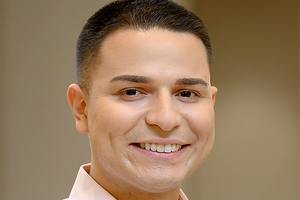
Matthew Bocanumenth is a first-year MGA student, helping to preserve the legacy of Colombia’s Truth Commission. A Colombian-U.S. American, Matthew is an advocate for intersectionality in peace and the protection of human rights in U.S. foreign policy, with a dedicated focus on the role of gender and the LGBTQ+ community in conflict. Matthew has also written about the reintegration of former combatants, such as the former Colombian rebel group FARC, and the need to include these former combatants in the peace process to ensure peace accord longevity and sustainability.
Tell us about your journey to the Kroc Institute; what led you to decide to study peace, specifically?
Though I was born in the United States, I grew up in Colombia during the development and codification of the Colombian Peace Accord, which signals a flagship step in the peace process. Witnessing the proliferation of a peace process and the reaction from civil society exposed me to the politicization of the process, and how that politicization fans the flames of extremism and polarization. This motivated me to study it on an academic level. I pursued international relations during my undergraduate career. International relations is focused on the “macro” level of peace, and I was ready to dive into more micro, grassroots-level work. After graduation, I went to work at The Washington Office on Latin America (WOLA), where I collaborated with policy analysts to advocate for a human rights center approach in the U.S. policy partnership with Colombia. I received exposure to grassroots human rights work and to the Kroc Institute’s partnership with the Peace Accords Matrix. This became the biggest draw to the International Peace concentration within the Master of Global Affairs program.
How does your identity manifest itself in your work and studies?
My family was affected by the Colombian conflict and, as I came to realize, this affected all Colombian families and every facet of our society. Having a dual nationality has afforded me a bit of separation, where I feel I can see things more objectively while understanding and connecting with lived experiences. Of course, as a Colombian, I feel the responsibility to give back to my country. I have seen the socioeconomic inequities and the long-term consequences of violence. Much of my work is dedicated to raising awareness surrounding these issues through documentation and analysis. The U.S. has a strong, longstanding bipartisan partnership with Colombia, and with this power, how do we channel it to protect minorities in the process?
You focus on intersectional aspects of peace, particularly the role of gender and LGBTQ+ persons. How have you been able to explore this since arriving in South Bend?
Last semester, we explored the different iterations, interactions, and aspects of peace in our Foundations of Peace Studies course. In this class, I chose to analyze the landmark LGBTQ+ provisions in the Colombian Truth Commission as my final research topic. I researched the intersections of LGBTQ+ and gender persecution during the conflict because now that there is increased visibility in the world, there is more backlash. It is important that we continue to investigate this under-researched topic within the field so that academics and practitioners can come together and advocate for the rights of LGBTQ+ people through peace, gender, and sexuality frameworks.
As a Colombian American, what has it been like to work with the Peace Accords Matrix at the Kroc Institute?
I currently work on the Truth Commission Legacy Project, which is so historic and monumental. The Legacy Project is an outcome of the Colombian Truth Commission and is tasked with preserving the historical memory of the Colombian conflict, from the violence that began over half a century ago to the origins of colonization. For me, it has been empowering to contribute to a project that preserves and enables academics and practitioners to distribute these resources nationally and internationally. By preserving truth, we can build and maintain peace.
How have your perspectives or interests changed since starting your Master’s program?
What has been a significant part of the program is the emphasis on positionality. During this program. I have learned how to appreciate the concept of constant critical reflection and dissect how my identity plays a role in my peacebuilding efforts. The Kroc Institute has empowered me to use self-reflection as a tool for building peace.
Where do you hope to see yourself after graduation?
I see myself working in or with the United States federal government to create foreign policy that recognizes the realities of what's [happening] on the ground, and that empowers the knowledge and expertise of locals. I am interested in bottom-top approaches, which ensure that economic and social justice reign. I see myself in a future career path promoting and dissecting intersectionality and grassroots efforts within policy to protect and empower historically marginalized groups.
How would you describe the peace program in one sentence to a prospective peace student, what would you say?
By engaging in dialogue, we can help construct visions of the world that empower the human dignity of all.
What has been your favorite moment during the master’s program thus far?
One highlight for me was the 2024 peace cohort’s family genogram presentations in our Developing a Peacebuilding Practice class. I got to know every person in my peace cohort and the hows and whys of who they are. It was a beautiful exercise.